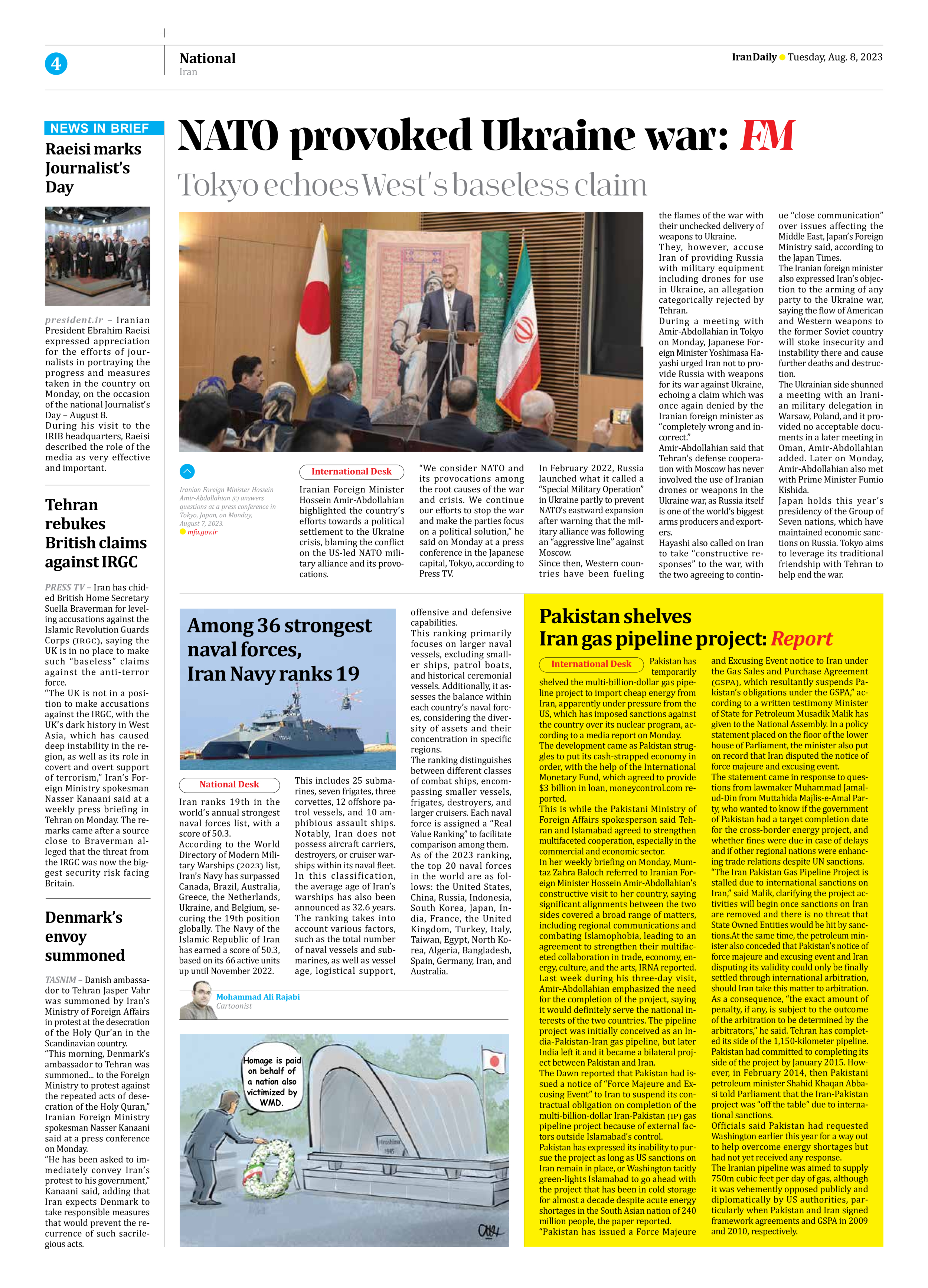
Pakistan shelves Iran gas pipeline project: Report
Pakistan has temporarily shelved the multi-billion-dollar gas pipeline project to import cheap energy from Iran, apparently under pressure from the US, which has imposed sanctions against the country over its nuclear program, according to a media report on Monday.
The development came as Pakistan struggles to put its cash-strapped economy in order, with the help of the International Monetary Fund, which agreed to provide $3 billion in loan, moneycontrol.com reported.
This is while the Pakistani Ministry of Foreign Affairs spokesperson said Tehran and Islamabad agreed to strengthen multifaceted cooperation, especially in the commercial and economic sector.
In her weekly briefing on Monday, Mumtaz Zahra Baloch referred to Iranian Foreign Minister Hossein Amir-Abdollahian’s constructive visit to her country, saying significant alignments between the two sides covered a broad range of matters, including regional communications and combating Islamophobia, leading to an agreement to strengthen their multifaceted collaboration in trade, economy, energy, culture, and the arts, IRNA reported.
Last week during his three-day visit, Amir-Abdollahian emphasized the need for the completion of the project, saying it would definitely serve the national interests of the two countries. The pipeline project was initially conceived as an India-Pakistan-Iran gas pipeline, but later India left it and it became a bilateral project between Pakistan and Iran.
The Dawn reported that Pakistan had issued a notice of “Force Majeure and Excusing Event” to Iran to suspend its contractual obligation on completion of the multi-billion-dollar Iran-Pakistan (IP) gas pipeline project because of external factors outside Islamabad’s control.
Pakistan has expressed its inability to pursue the project as long as US sanctions on Iran remain in place, or Washington tacitly green-lights Islamabad to go ahead with the project that has been in cold storage for almost a decade despite acute energy shortages in the South Asian nation of 240 million people, the paper reported.
“Pakistan has issued a Force Majeure and Excusing Event notice to Iran under the Gas Sales and Purchase Agreement (GSPA), which resultantly suspends Pakistan’s obligations under the GSPA,” according to a written testimony Minister of State for Petroleum Musadik Malik has given to the National Assembly. In a policy statement placed on the floor of the lower house of Parliament, the minister also put on record that Iran disputed the notice of force majeure and excusing event.
The statement came in response to questions from lawmaker Muhammad Jamal-ud-Din from Muttahida Majlis-e-Amal Party, who wanted to know if the government of Pakistan had a target completion date for the cross-border energy project, and whether fines were due in case of delays and if other regional nations were enhancing trade relations despite UN sanctions.
“The Iran Pakistan Gas Pipeline Project is stalled due to international sanctions on Iran,” said Malik, clarifying the project activities will begin once sanctions on Iran are removed and there is no threat that State Owned Entities would be hit by sanctions.At the same time, the petroleum minister also conceded that Pakistan’s notice of force majeure and excusing event and Iran disputing its validity could only be finally settled through international arbitration, should Iran take this matter to arbitration.
As a consequence, “the exact amount of penalty, if any, is subject to the outcome of the arbitration to be determined by the arbitrators,” he said. Tehran has completed its side of the 1,150-kilometer pipeline. Pakistan had committed to completing its side of the project by January 2015. However, in February 2014, then Pakistani petroleum minister Shahid Khaqan Abbasi told Parliament that the Iran-Pakistan project was “off the table” due to international sanctions.
Officials said Pakistan had requested Washington earlier this year for a way out to help overcome energy shortages but had not yet received any response.
The Iranian pipeline was aimed to supply 750m cubic feet per day of gas, although it was vehemently opposed publicly and diplomatically by US authorities, particularly when Pakistan and Iran signed framework agreements and GSPA in 2009 and 2010, respectively.







